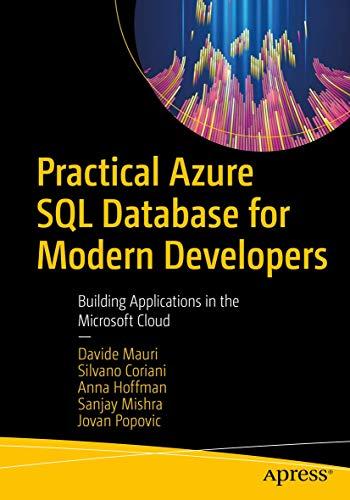Question
2. Explain how our sample shell implements the change direct ory command. 3. What would happen if this program did not use the fork function,
2. Explain how our sample shell implements the change direct
ory command.
3. What would happen if this program did not use the fork function, but
just used execv
directly? (Try it!)
Try temporarily changing the code 'pid_from_fork = fork();'
to 'pid_from_fork = 0;
5. What would happen if fork() were called prior to chdir(), and chdir()
invoked within the
/* SMP1: Simple Shell */
/* LIBRARY SECTION */ #include
#include "smp1_tests.h" /* Built-in test system */
/* DEFINE SECTION */ #define SHELL_BUFFER_SIZE 256 /* Size of the Shell input buffer */ #define SHELL_MAX_ARGS 8 /* Maximum number of arguments parsed */
/* VARIABLE SECTION */ enum { STATE_SPACE, STATE_NON_SPACE }; /* Parser states */
int imthechild(const char *path_to_exec, char *const args[]) { return execv(path_to_exec, args) ? -1 : 0; }
void imtheparent(pid_t child_pid, int run_in_background) { int child_return_val, child_error_code;
/* fork returned a positive pid so we are the parent */ fprintf(stderr, " Parent says 'child process has been forked with pid=%d' ", child_pid); if (run_in_background) { fprintf(stderr, " Parent says 'run_in_background=1 ... so we're not waiting for the child' "); return; } wait(&child_return_val); /* Use the WEXITSTATUS to extract the status code from the return value */ child_error_code = WEXITSTATUS(child_return_val); fprintf(stderr, " Parent says 'wait() returned so the child with pid=%d is finished.' ", child_pid); if (child_error_code != 0) { /* Error: Child process failed. Most likely a failed exec */ fprintf(stderr, " Parent says 'Child process %d failed with code %d' ", child_pid, child_error_code); } }
/* MAIN PROCEDURE SECTION */ int main(int argc, char **argv) { pid_t shell_pid, pid_from_fork; int n_read, i, exec_argc, parser_state, run_in_background; /* buffer: The Shell's input buffer. */ char buffer[SHELL_BUFFER_SIZE]; /* exec_argv: Arguments passed to exec call including NULL terminator. */ char *exec_argv[SHELL_MAX_ARGS + 1];
/* Entrypoint for the testrunner program */ if (argc > 1 && !strcmp(argv[1], "-test")) { return run_smp1_tests(argc - 1, argv + 1); }
/* Allow the Shell prompt to display the pid of this process */ shell_pid = getpid();
while (1) { /* The Shell runs in an infinite loop, processing input. */
fprintf(stdout, "Shell(pid=%d)> ", shell_pid); fflush(stdout);
/* Read a line of input. */ if (fgets(buffer, SHELL_BUFFER_SIZE, stdin) == NULL) return EXIT_SUCCESS; n_read = strlen(buffer); run_in_background = n_read > 2 && buffer[n_read - 2] == '&'; buffer[n_read - run_in_background - 1] = ' ';
/* Parse the arguments: the first argument is the file or command * * we want to run. */
parser_state = STATE_SPACE; for (exec_argc = 0, i = 0; (buffer[i] != ' ') && (exec_argc < SHELL_MAX_ARGS); i++) {
if (!isspace(buffer[i])) { if (parser_state == STATE_SPACE) exec_argv[exec_argc++] = &buffer[i]; parser_state = STATE_NON_SPACE; } else { buffer[i] = '\0'; parser_state = STATE_SPACE; } }
/* run_in_background is 1 if the input line's last character * * is an ampersand (indicating background execution). */
buffer[i] = '\0'; /* Terminate input, overwriting the '&' if it exists */
/* If no command was given (empty line) the Shell just prints the prompt again */ if (!exec_argc) continue; /* Terminate the list of exec parameters with NULL */ exec_argv[exec_argc] = NULL;
/* If Shell runs 'exit' it exits the program. */ if (!strcmp(exec_argv[0], "exit")) { printf("Exiting process %d ", shell_pid); return EXIT_SUCCESS; /* End Shell program */
} else if (!strcmp(exec_argv[0], "cd") && exec_argc > 1) { /* Running 'cd' changes the Shell's working directory. */ /* Alternative: try chdir inside a forked child: if(fork() == 0) { */ if (chdir(exec_argv[1])) /* Error: change directory failed */ fprintf(stderr, "cd: failed to chdir %s ", exec_argv[1]); /* End alternative: exit(EXIT_SUCCESS);} */
} else { /* Execute Commands */ /* Try replacing 'fork()' with '0'. What happens? */ pid_from_fork = fork();
if (pid_from_fork < 0) { /* Error: fork() failed. Unlikely, but possible (e.g. OS * * kernel runs out of memory or process descriptors). */ fprintf(stderr, "fork failed "); continue; } if (pid_from_fork == 0) { return imthechild(exec_argv[0], &exec_argv[0]); /* Exit from main. */ } else { imtheparent(pid_from_fork, run_in_background); /* Parent will continue around the loop. */ } } /* end if */ } /* end while loop */
return EXIT_SUCCESS; } /* end main() */
forked child process? (Try it!)
Try temporarily changing the code for 'cd' to use fork:
if (fork() == 0) {
if (chdir(exec_argv[1]))
/* Error: change directory failed */
fprintf(stderr, "cd: failed to chdir %s
\
n", exec_argv[1]);
exit(EXIT_SUCCESS);
}
Step by Step Solution
There are 3 Steps involved in it
Step: 1

Get Instant Access to Expert-Tailored Solutions
See step-by-step solutions with expert insights and AI powered tools for academic success
Step: 2

Step: 3

Ace Your Homework with AI
Get the answers you need in no time with our AI-driven, step-by-step assistance
Get Started


